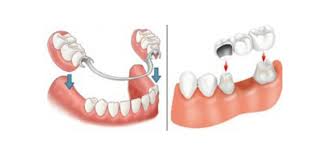Dentures: Advantages and Disadvantages

Dentures: Advantages and Disadvantages, Beforehand, we discussed the kinds of false teeth; the total and halfway false teeth. Presently, we will discuss the favorable circumstances and detriments of false teeth.
As much as we need to profit by this counterfeit teeth, there are still a few burdens it convey and it’s typical.
Disadvantages
Dentures: Advantages and Disadvantages, We should begin with the inconveniences so we can complete this read on a positive note.
Moving. Since false teeth are removable the chance of moving is consistently present. We generally observe recordings when they inadvertently let their false teeth out while talking, correct? However, this is uncommon to happen particularly in case you’re cognizant while talking and you become acclimated to it.
Cleaning. To keep up the shading and quality of a dental replacement, cleaning ought to be done gently. All things considered, it’s not hard to clean your false teeth for a stunning grin instead of losing your certainty while losing your tooth.
- They do not quite look as natural as dental implants.
- They must be removed and thoroughly cleaned regularly. Many patients find the cleaning of cups and adhesives undesirable because they are messy and expensive.
- Dentures are not worn overnight.
- Sometimes dentures slip around making it difficult to speak and eat.
- Certain foods cannot be eaten with dentures. Examples include caramel, apples and corn on the cob.
- There’s an increased risk of gum disease if food is trapped by the dentures.
- They frequently need replacement (every 3 to 6 years compared to 20+ years for dental implants). Also, they’ll break if dropped, requiring replacement.
- Partial dentures are known to weaken the adjacent natural teeth that provide support for the dentures.
Advantages
Dentures: Advantages and Disadvantages, Losing your teeth particularly those that are obvious when grinning can pull down your certainty. Having a counterfeit to fill those rotted and removed teeth will take out the cynicism and modesty to grin.
Dentures: Advantages and Disadvantages, Correspondence will consistently be the key. Also, with a total teeth, talking issues will be tackled. Talking obviously is as simple as pie.
Life span. A dental replacement can last as long as 10 years before it tends to be supplanted. Anyway, what’s the concern?
- Dentures are less costly than implants, making them the most affordable option for most patients.
- Many people choose to start with dentures. Since they are less expensive a patient may try them out and see how they feel.
- If you have just had teeth removed recently, starting with dentures will allow your body time to heal before considering implants.
- Depending on the location of the missing teeth, dentures may be a perfect solution. (Patients often find upper dentures look good and are easy to wear.)
- The process to create the dentures is non-invasive. No surgery required.
- If additional teeth are lost in the future, it is easy to modify the dentures to accommodate the loss.
Pros and Cons of Permanent Dentures
Dentures: Advantages and Disadvantages, Are you wearing removable dentures that are poorly fitted and wobbly? If so, you may wish to consider getting permanent dentures. If you have one or more missing teeth, there are many treatment options that are designed to restore function and beauty to your smile.
Dentures offer one of the most cost-effective methods for replacing missing teeth. However, if not fitted properly, removable dentures may start to loosen and shift over time, causing discomfort while hindering speech and eating. Prolonged wearing of removable dentures can also lead to jaw bone shrinkage. Yet another complaint is dealing with the messy and sticky denture adhesives – incidentally, not the most stable way of holding your artificial teeth in position.
Full Dentures – Are There Different Types?
Dentures: Advantages and Disadvantages, Advanced dental technology has given modern patients the ability to resolve these issues with Permanent Dentures. Fixed dentures – also know as non-removable dentures – are basically denture devices that consist of a row of prosthetic teeth connected to a framework that is held in position by dental implants. With permanent dentures, patients can eat, chew, bite, talk and smile – without the fear that their prosthetic teeth may slip and slide when they do these daily activities.
